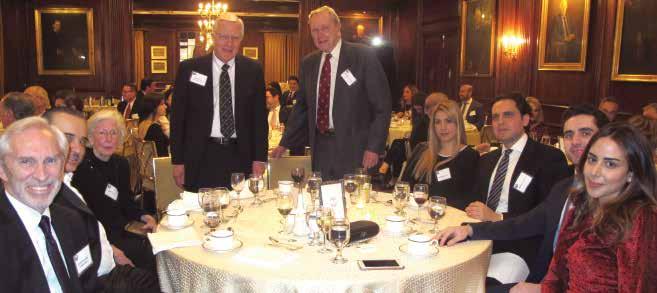
4 minute read
The Language of Sound

From Berlin to Beirut. It was a novel idea. Of course, IC will participate. For it is not every day that students will get a chance to stop lessons and listen to the world around them.
And so it was German representatives from the Humboldt Forum Academy arrived in November from Berlin to the Ain Aar campus to work with 20 Grade 6 students on a pilot workshop called “capturing Be & Be (Berlin to Beirut), from mouth to ear.”
The focus was sound. Sounds created. Sounds discovered. Loud sounds. Squeaky sounds. Low sounds. Murmuring sounds.
It is a language of its own. And thanks to Thomas Edison and his phonograph, this language has its own channel.
Who better to revel in this language than young listeners just awakening to the world around them.
As their German peers took off in their journey of discovering sounds, so did IC students – led by Emanuele Valariano, Felix Classen and Siska.
Lessons were stopped for a week – except for two hours at the end of the day – as students worked intensively uncovering various sounds. The workshop is based on a wellknown Chinese game, better known in Lebanon as ‘téléphone cassé.’ The use of the game emphasizes the depth of sounds and its layers in a general perspective and encourages students to conduct experimental improvisations in sound making. The result of both simultaneous workshops in Berlin and Beirut, would be a recording and a joint exhibition at the prestigious Humboldt Box in Berlin entitled “[Loudly] Listen to the World”.
While German students used the Berlin phonogram archive of the Ethnological Museum (sound archive of the Humboldt University in Berlin), IC students received much of their knowledge from the AMAR Foundation that boasts one of the largest collections of historic recordings from the entire Arab region.
For a week, Ain Aar Upper School hallways resonated with interesting and yet sometimes eerie sounds. It could be the scraping of chairs, the overturning of tables, the indiscernible


thuds of this or that.
Or very simply, “the falling of leaves or olives,” said Yara Oun, 11. “Listen closely and you can hear it.”
Or sounds you never thought existed. “I just removed a plastic bottle cap stuck in a hole in the ground,” said Carlos Daoui. “That produced a great sound.”
The sixth graders were seen all over the campus recording sounds, following people around as they examined different shoe soles, infiltrating the Preschool playground to record the hum of tricycle wheels.
The basketball court, the football field – all suddenly spoke to them. It was an exciting language.
Ilias Oun simply overturned a drum and “made different sounds,” he said. “You wouldn’t think so but it does.”
Alexandre Elias and his group created a human beat box – vocal percussion imitating drum machines using their mouth, lips, tongues and voice.
Lucas Chirazi experimented with paper. But crinkling noises were not particularly appeasing to 11-year-old boys. Yet unfolding a paper in a certain way “can create a huge popping noise,” he said.
Leonard Labaki was only too pleased to demonstrate.
True, it was a sound which promises to jolt any unsuspecting teacher and parent.
And, of course, there were the tried-and-tested old-fashioned lessons unremittingly repeated and regularly disregarded by offspring: “loud noises are harmful to the eardrum especially when wearing headphones,” explained Lea Abu Sleiman, while some noises “are disturbing in class,” declared Elias Tawk.
“It was like a new horizon opened up to our students,” said IC music teacher, Arlette Akl, who worked alongside the German delegation during their stay. “It was a challenging week. The group work was intensive in every way. But at the end, the recording was amazing.”
No regrets. Especially none from IC Upper Elementary and Middle School Director, Diana Aboulebde.
It was she who received a surprising email one morning from the parent of a former student who recalled the Director’s fondness for the arts. Would Aboulebde be interested in allowing her students a week off to partake in a joint Berlin-Beirut workshop?
“I didn’t even hesitate,” said Aboulebde. “Education is not all about academics. Arts, music and drama are equally important. Such a project would benefit our students and expose them to new experiences. Of course we will take part.”
The workshop was concluded with an exhibition for parents.
As for the students, the experience has been an amazing journey into a world of sounds but most important – and, when you are 11, a very vital side note: it was a chance to miss a whole week of formal lessons.

The exhibition “[Loudly] Listen to the World” opened on March 22 and will continue until 16 September at the Humboldt-Box, Berlin.











